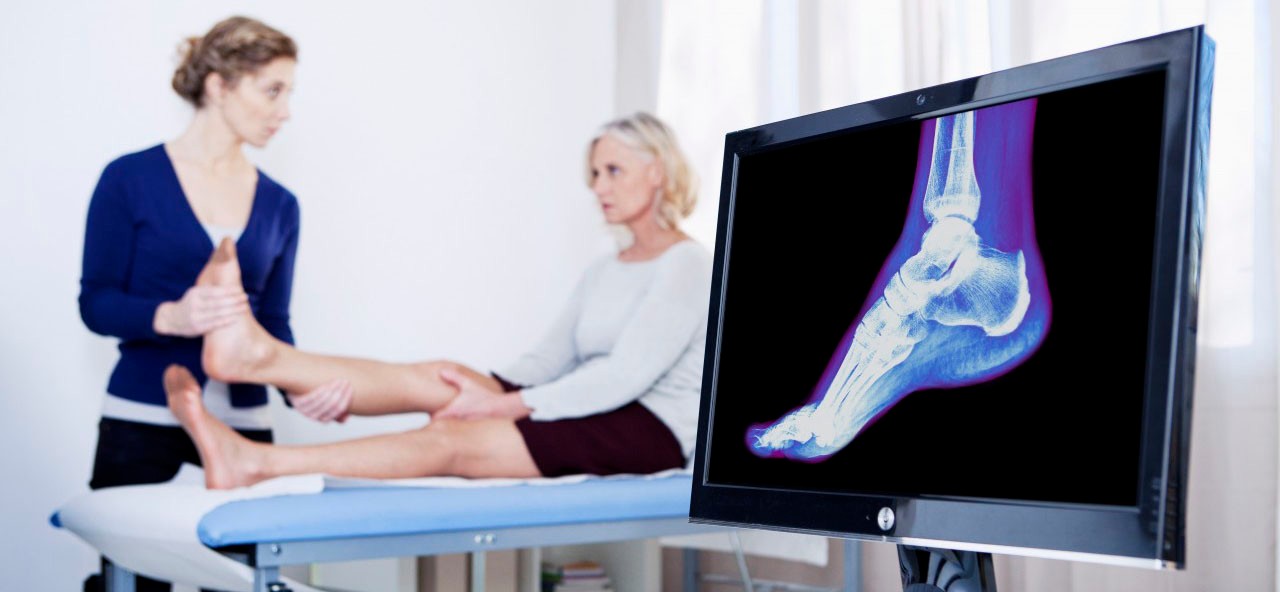Pain on Top of Foot

Top of foot pain can make walking or even wearing shoes hurt — and the cause isn’t always obvious. Learn the causes and symptoms of pain on top of foot.
Have you ever gotten out of bed and suddenly realized something was terribly wrong with your foot? Maybe standing and placing any weight on your foot hurt, or just trying to put on your shoes caused you to wince due to top of foot pain.
Pains on top of foot aren’t unusual. After all, feet are complicated parts of our bodies that are subjected to a lot of constant use and pressure. Each foot is made up of 28 bones, 30 joints, and more than 100 ligaments, tendons, and muscles, all working together so your feet function normally, the Arthritis Foundation points out.
And if any of part of a foot is damaged or inflamed, it can impact your balance and mobility and cause serious discomfort — including pain on top of foot.
YOU MIGHT ALSO LIKE: What Is Hammer Toe?
Overuse is the main cause of pains on top of foot
Overuse and extra stress placed on your feet by repetitive actions, including sports, are the main causes of pains on top of foot. If you jog or play a sport like soccer or basketball and suffer from pain on top of your foot, inflammation of tendons that run along the top of the foot — a condition known as tendonitis — is likely the cause. Ill-fitting, too tight shoes can also produce the painful top of foot symptoms that marks tendonitis.
Of course, a fall can result in a painful broken foot. But you can also experience less serious, but often very painful, fractures due to an even minor accident, according to the American Orthopaedic Foot & Ankle Society (AOFAS).
Stress fractures are small cracks in a foot bone, most often the result of overuse, such as starting a new exercise or sport (especially running, gymnastics and dance), the AOFAS explains. Osteoporosis also increases the risk of a stress fracture. Symptoms can include pain on top of the foot when you try to stand or walk. Most stress fractures will heal with conservative treatment — staying off your foot as much as possible until it heals.
More causes of pain on top of foot
- Neuromas. When a nerve in your foot is irritated from walking and shoe pressure, it can swell — causing a condition known as a neuroma. Although the most common type of neuroma occurs on the bottom of the foot between the toes, a neuroma can also cause top of foot painful symptoms. Wider or padded shoes can often help relieve neuroma pain.
- Diabetic neuropathy. Diabetes can cause in nerve damage, resulting in numbness, tingling, or pain anywhere on feet. Properly fitting shoes can help protect your feet and avoid injury if you have neuropathy.
- Arthritis. Many types of arthritis affect joints, bones, and muscles and can cause pain, stiffness, and swelling in the feet, the Arthritis Foundation explains, including top of foot pain. Osteoarthritis, characterized by the breakdown of bone cartilage, most commonly affects the big toe. However, it can cause pain in the middle of your top foot, too. Rheumatoid arthritis is a chronic, inflammatory autoimmune disease that can affect the small joints of the feet, causing symptoms in several areas of both feet, including top of foot pain.
- Gout. A type of arthritis that causes painful and stiff joints, gout is caused by crystals made of a substance called uric acid. The crystals accumulate and cause foot pain, often starting in the big toe but then spreading to different joints in your feet, according to the National Institute of Arthritis and Musculoskeletal and Skin Diseases.
Bottom line? Persistent pain on top foot need medical care
If your top of foot is painful, try rest, over-the-counter pain relievers, and ice packs to reduce swelling. But if pains on top of your foot are persistent and last more than seven days, call your doctor. The AOFAS advises seeking immediate medical care if your foot pain is so severe you can’t walk, or if you have numbness, tingling, or other signs of nerve damage.
Updated:
March 25, 2020
Reviewed By:
Janet O’Dell, RN